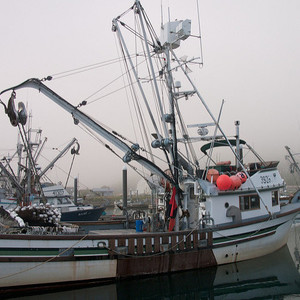Government policies designed to prevent overfishing inadvertently made halibut fishing in Alaska very dangerous. Fishermen pushed back, and a new policy was put in place that has made the industry safer. It regulated competition by making the fishing more efficient. Listen to this story to understand how government mandated changes in the market structure had unintended consequences.
Listen to the story
ARI SHAPIRO: For a long time, Alaska’s commercial fishing industry was the deadliest in the country. This year, though, the Coastguard says there has not been a single on-the-job fishing fatality. Jess Jiang from the Planet Money podcast explains how fishing got safer.
JESS JIANG: It used to be if you were a halibut fishermen in Homer, Ak., there were just a few days a year you could go do it. The government said you just had these 24 hour periods. It was called the derby.
CLEM TILLION: Young men loved the action, the excitement.
JIANG: Clem Tillion is 90 now. He was a fisherman for decades. He says on derby days, no matter what the weather was like, you fished – same if you were sick or if your boat wasn’t in great shape.
TILLION: You went roaring out of these storms, and you caught all you could catch. And the guys that took the most risks got lots of money.
JIANG: Thousands of boats were going out, sometimes during storms. And you can imagine what happened. Kirk Van Doren is a commercial fisherman. He’s thin, got crazy hair, goes by the name Carcass. He tells me about one derby day. He was working as a deckhand on someone else’s boat, and the fishing had been good. But a storm was coming, and the waves were getting big.
CARCASS: All of a sudden we took one, and we’re not coming back up, water’s all over the deck. The next wave hit us, and we just leaned right over.
JIANG: The boat was sinking. Carcass dug out the life raft. He and the other crew members waited for the government to come rescue them.
CARCASS: I’ll tell you the most beautiful sound in the world is a C-130 (imitating sound of airplane). It’s the Coast Guard airplane, and that’s when you really think you’re going to survive, you know?
JIANG: Everyone made it home. Clem Tillion, the 90-year-old, says Carcass’s story isn’t unique. The derby the government created led fishermen to take very more risks.
TILLION: It was a very stupid system. It was murder by government, you might say. And a few of us were looking at other ways of doing it.
JIANG: Clem was on the fishery’s council at the time. He heard about an idea – a new, more leisurely system that protected the fish but didn’t put fishermen at risk. Instead of having fishermen race in these 24-hour sprints, they would be guaranteed a certain amount of fish at the beginning of the year. And with the guarantees, the fishermen didn’t have to rush. They could wait for sunny weather or until they weren’t sick. Clem knew these guarantees would be worth a fortune.
TILLION: Some people became millionaires overnight.
JIANG: Everyone from the ship captain down to the deckhand wanted them. The question was, who would get them? Clem thought the catch should be shared among the boat owners and captains. They invested a lot of money in gear and boats. But when deckhands, guys like Carcass, heard about this plan, they were not happy.
TILLION: There were mass demonstrations in some towns. My niece had her tires slashed, and my kids got beat up on the playground. I mean, it was violent.
JIANG: Clem and the owners won out. In 1995, each boat owner got a share of the total catch. And with that, the derby was gone. Now 20 years later, 2 out of every 3 boats stopped fishing halibut. That was by design. Clem wanted the best boats to buy up the shares from the less efficient ones. Some deckhands, like Carcass, kept at it, but whole crews were laid off. And today, for those who are left, the job is better.
So this is the boat.
CRISTY FRY: This is us. This is our little boat.
JIANG: Cristy Fry and her husband David take me out on their boat, the Realist. David drives out of the harbor, and Cristy puts on an orange slicker. The Frys get to pick when they go out. If, say, a storm is coming, they stay at home, watch Netflix. Today, the water is calm. Fishing used to be crowded, but we don’t see another commercial fishing boat the whole day, just a few whales and otters.
C. FRY: Fish, fish, fish – keeper.
JIANG: He’s a fighter.
DAVID FRY: (Laughter).
JIANG: Christy puts a knife through the gills and removes the guts. She says during the derby days, she didn’t have time to take care of the fish like this. She used to have to throw fish after fish on ice and hope everything stayed fresh. Now she can take more time with the fish, and that makes the quality better. On this trip, Cristy and David catch just six fish, but the good news for them and the others who still have shares – they can just go out another day.
 © 2015 National Public Radio, Inc. Used with the permission of NPR. All rights reserved.
© 2015 National Public Radio, Inc. Used with the permission of NPR. All rights reserved. Vocabulary
- commercial – concerned with making a profit; concerned with commerce
- derby – a sporting contest
- fishery – a fishing ground or area where fish are caught
- stagnant – inactive
Listening Comprehension Questions
- What caused Alaskan halibut fishing to become so dangerous?
- How did fishermen like Clem Tillion want to make the system safer?
- Who disagreed with Tillion’s ideas, and why did they disagree?
- Why are many fewer people fishing for halibut now?
- Explain what market structure first governed Alaskan halibut fishing and how the new government policies changed the market structure.
Discussion Themes
- Would you have supported the plan that was put in place in 1995 that changed the way fishermen fished for and were paid for halibut? Why or why not?
- Based on what you heard, what role do you think the government should play in the fishing industry? Explain your answer.
Teacher’s Guide
Activate student knowledge: Open class by asking students about market structures. There are four basic types of market structures: perfect competition, imperfect competition, oligopoly, and monopoly. In the audio story the government changes the market structure by making regulations to protect fish whose population is threatened by too much fishing. The rules limited the times that people could fish for halibut to a few 24-hour periods each year. The new rules granted fishermen a certain amount of fish, a catch limit, at the start of the year. Some complained this created unfair competition.
Introduce the story: In this audio story, you will hear about what happened after the government changed the market structure in the halibut fishing industry. Listen to learn about the unintended consequences of the regulation, how fishermen worked to fix it, and how competition among commercial fishermen was affected.
Active listening supports:
- The Market Structure in the Fishing Industry Chart will guide student listening as they take notes on the audio story.
- The Language Identification organizer allows students to follow along and track important phrases while listening to the story.
Reflect on the story: Take time for student reflection on the audio story and discussion questions to check for understanding. Focus students’ attention on competition among fishermen. Ask them to reflect on how the first government policy, intended to protect halibut, intensified competition among fishermen to a deadly level. Then point them to what happened to competition with the implementation of the new policy in 1995.
Paired Text: Use the posting by wildlife expert Robin Barefield Commercial Halibut Fishing to pair with this audio story. This explanatory text provides a more detailed history of commercial halibut fishing than the audio story and discusses the 1995 halibut fishing policy.


